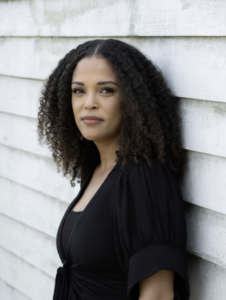
Photo courtesy: Beowulf Sheehan
Two-time National Book Award for Fiction-winner Jesmyn Ward will be in conversation with author LeVar Burton Saturday, Sept. 14 at the Mississippi Book Festival in Jackson, Miss.
Before she was a nationally acclaimed novelist, Ward was the 2010-2011 John and Renée Grisham Writer in Residence at the University of Mississippi.
The UM Masters of Fine Arts in English website describes Grisham Writers in Residence as “emerging writers selected on the strength of their writing.” The writers have no official duties other than teaching one class per semester and writing, though they often become an essential member of the MFA community.
Ward explained why she found Oxford and UM important to the literary community.
“One of the things that I really loved about Oxford when I was there as the Grisham writer was that sense of community that there is between writers and the people in the English department,” she said. “But then also with the great bookstores in the area.”
The Mississippi Book Festival is a stop on her tour promoting the paperback version of her most recent release, a work of historical fiction titled “Let Us Descend.” Released in October 2023, the novel addresses the pain that enslaved people in the United States endured.
This will not be Ward’s first appearance at the Mississippi Book Festival.
“One of the first events that I did at the Mississippi Book Festival was a panel that was tied into ‘The Fire This Time,’ which was a collection that I edited. … It was a group of amazing writers,” Ward said. “I love being able to meet other writers who take part in the festival and be a part of that community.”
Joining Ward onstage at the Mississippi Book Festival is LeVar Burton, host of the children’s television show “Reading Rainbow,” which aired from 1983 to 2006.
Ward expressed her love for the readers that come to the Mississippi Book Festival.
“I really love the audience too, because they’re so excited to be there; they’re really invested in taking part in the events, and witnessing the events and asking questions,” Ward said
Ward hails from DeLisle, Miss., and works to create clear images of the South in her writing; this is a contrast to the pastoral romanticization often associated with traditional Southern novels such as “Gone with the Wind.”
“I wanted to write about the kind of people that I grew up with, the kind of people who are in my family and the kind of people that I was surrounded by in Mississippi in part because I didn’t really see those people in literature when I was growing up,” Ward said. “I wanted to write their stories because I wanted them to be present in the world of fiction and creative nonfiction.”
When asked about how living and growing up in the South impacts her writing, she emphasized how maintaining her relationship with the South is integral to telling a clear story of her community.
“I think one of the reasons that it’s important for me to nurture and maintain the roots that I have in Mississippi, both in my hometown and just around the state in general, is because I feel like maintaining those roots and those connections enables me to be more honest and clear eyed in my work,” Ward said. “I think if I didn’t maintain those roots and didn’t maintain those connections, that it would be easier for me to sort of gloss over the realities of what it’s like to live in Mississippi.”
While her most recent novel depicts the horrors of slavery, her previous novels, “Where the Line Bleeds,” “Salvage the Bones” and “Sing, Unburied, Sing,” detail experiences of growing up and residing in Mississippi. Ward writes on topics such as drug addiction, the Parchman Mississippi State Penitentiary and the devastation that followed Hurricane Katrina.
Ward says that she ultimately wants to have a hand in giving young Southerners a space in literary fiction.
“Literature can make you feel a little bit less alone in whatever you’re living through. … It can give you a blueprint, or key, to better understand and move through your own life,” Ward said. “I hope that when students read my work … it helps them navigate their own lives.”


























